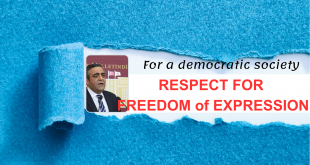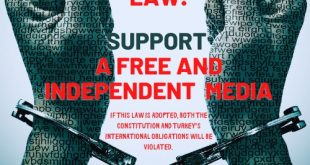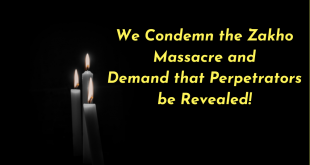Aims and Brief History of Helsinki Citizens’ Assembly
Helsinki Citizens’ Assembly [hCa] is a non-governmental organization, working on the notions of fundamental rights and freedoms, peace, democracy and pluralism.
hCa, works independently from political parties, government and states, aims to;
* introduce the basic rights and freedoms accepted in international agreements and outlined by universal standards into daily life
* to promote peaceful processes for the resolution of problems through mutual understanding dialogue and peace
* to improve pluralist democratic bodies and civil society initiatives
* to ensure the supremacy of law and to defend an economic system that promotes the well-being of human life and the environment.
hCa acts with the basic premise that citizens should have a say on the actions and decisions that are directly affecting their life. It takes special care to create a space where differing sides can discuss their problems and produce solutions in the resolution of social problems. It tries to constitute a chain of contact, dialogue and mutual understanding, leading to cooperation and peaceful co-existence.
The Helsinki Citizens’ Assembly, an international conference which is the basis of HCA Turkey’s work, is an inter-communal cooperation and communication network working within the framework of peace, human rights, an economy that is promoting the environment, the supremacy of law and international democracy.
The Helsinki Final Act, which has founded the basis for the improvement of the necessary conditions of a peaceful environment in Europe, proclaimed human rights to be a common value that every community had to respect throughout the world. The word “Helsinki” in our title refers to the exceptional importance of this agreement. hCa aims to extend the Helsinki process, which continues along with OSCE (Organization for Security and Cooperation in Europe) and the Charter of Paris, as well as at the level of states and governments. It believes that the goals, principles and values defined by the Act and other similar international instruments can only be realized from the grass-root level, and that inter-communal dialogue must be enriched.
Since 1993 to the present
Since its establishment in September, 1993, Helsinki Citizens’ Assembly [hCa] Turkey has been conducting activities in the following fields:
• Minority rights and multiculturalism
• Civic approaches to conflicts
• The rule of law
• Human rights and civic participation
• Strenghtening local democracy and civil society
• EU integration process
hCa-Turkey’s activities are organized on the basis of projects and campaigns with definite themes. To reach its goals, hCa-Turkey holds local or international conferences, meetings, seminars, panels, symposia and exhibits; provides audiovisual and print publications, collaborates with non-govermental organizations and institutions working in related fields.
Minority Rights and Multiculturalism
In the modern age, multiculturalism is considered as one of the key attributes of a developed society and is seen as a fundamental concept in the framework of coexistence. Policies concerning identity concepts and the “other" issue have been at the center of debates for a long time and such debates seem likely to continue. hCa is conducting activities to encourage the peaceful coexistence of different cultures and to support efforts aiming to safeguard cultural rights. Some of these activities are:
• “Coexistence” – Symposium on Religion and State Relations in Turkey, İstanbul, 1994.
• “A Wider Europe: Modernization and Pluralism”, international round table meeting, İstanbul, 2000.
• “Local Cultures and European Integration”, international round table meeting and panel, Urfa, 2000.
• “The Future of Multiculturalism: European Integration and Globalisation”, international round table meeting, Mersin, 2001.
• “Immigrants Who Came to Turkey from Greece during the Population Exchange in the 1920s”, research study, 2001 October – June 2002.
• "Language Rights in the EU Integration Process”, international round table meeting, panel, documentary film show, an exhibition titled “The Multi-Lingual Festival in Europe: Periodicals” and a report titled “Language Rights in Europe: A General Framework”, İstanbul, 2003.
Civic Perspectives Against Armed Conflicts
hCa conducts activities to support peaceful solutions to conflicts which sometimes lead to armed clashes and are caused by politic, religious and ethnic polarization. These activities also aim to strengthen civic perspectives in some problematic fields which closely concern Turkey. Some of these activities are:
• The Middle East Peace Process Conference held after the Gulf War with the participation of countries in the region, İstanbul, 1991.
• Peace Initiative for the Kurdish Question Conference, İstanbul, 1992.
• Distribution of a million leaflets by plane after the Sivas massacre, İstanbul, 1993.
• “Bosnia is Alive” aid campaign, 1994-1995.
• “Civic Perspectives Against Armed Conflicts and Youth Participation”, international summer school, Çanakkale, 1997.
• Distribution of the “Call for a Peaceful Resolution in Kosovo”, prepared by the Civic Perspectives Against Armed Conflicts Commission of the hCa, to various NGOs and the media, in Turkey and abroad, 1999.
• “The Importance of Non-Governmental Organization in Balkans, Caucasus and Europe: Civic Approaches to Resolve Conflicts for a more Peaceful World”, international summer school, Çanakkale, 2000.
• International round-table meeting titled “’Terrorism’ and the New War” on the September 11 attacks and the US war on Afghanistan, İstanbul, 2001.
• “Civic Approaches in the Turkey-Armenia Dialogue”, international round-table meeting, İstanbul, 2002.
• “International Interventions, Legitimacy and the Iraqi Crisis”, panel, İstanbul, 2003.
The Rule of Law
The rule of law is the conceptual basis for democracy; ensuring the rule of law is also the only effective way of protecting human rights. For a long time, the Helsinki Citizens' Assembly has been conducting activities to support the institutionalization of the rule of law, freedom of association and expression and, especially the freedom to found associations:
• "Freedom of Expression in Turkey In Light of Recent Developments", a panel focusing on the Turkish Penal Code, İstanbul, 1998.
• Two round table meetings -one of them international- and a panel, as part of the study "Problems Faced in Implementing Decisions of the Administrative Courts", İstanbul, 1999-2000.
• “Freedom of Association in Europe”, study report, 2001.
• Local meetings focused on legal problems faced by associations as part of the study "Freedom of Association in Turkey", İstanbul, Mersin, Diyarbakır, Ankara, 2000-2001.
• Reception for the "Freedom of Association in Turkey" report prepared by the hCa Working Group, Ankara, 2002.
• "Civics for NGOs" training programme aiming to discuss ways of expanding the freedom of association and expression, İstanbul, 2003 and "Guides for NGOs" training programme, Muğla, 2004.
• “Freedom of Association in the Framework of EU Adjustment Reforms”, working meetings focusing on laws governing associations with the participation of public administration officials and NGOs, Ankara, 2004.
Human Rights and Citizenship
hCa is working to develop new and creative approaches in the human rights struggle and is focusing on creating viable mechanisms for reducing human rights abuses. Some of the activites of hCa in this field are:
• “The 'Year for Tolerance': Refugees in Turkey”, international symposium, İstanbul, 1995.
• "Implementation of the Human Rights Standards Accepted by Turkey, a Member of the European Council and OSCE", an international meeting jointly organized by hCa and the International Helsinki Federation for Human Rights, İstanbul, 1999.
• F-type Prisons’ Report, 2001.
• "Human Rights Education for College Students", realized in cooperation with Amnesty International and the Civic Involvement Projects supported by Sabancı University, İstanbul, 2002-2003.
• Local introductory meetings and a Middle East-Turkey Regional Training Seminar as part of the "The New Tactics in Human Rights" project, Ankara, Diyarbakır, İzmir and İstanbul, 2002-2003.
• New Tactics in Human Rights International Symposium, Ankara, 2004.
Local Democracy and the Strengthening of Civil Society
HCa undertakes activities aiming to strengthen local democracy through giving support to civic participation in society and social affairs and more specifically, activities encouraging cooperation between civic initiatives and municipal administrations as well as partnerships between municipalities:
• A seminar in İstanbul and working meetings in Çanakkale, Bursa, Mersin and Van, as part of the study "Civic Participation: Partnership and Cooperation Between NGOs and Municipal Administrations", 1994–1997.
• “How Municipal Administrations Can Gauge People’s Demands?”, conference, Gaziantep, 1997.
• “Capacity Enhancement and Ethics in NGOs”, international working meeting, İstanbul, 1998
• “Democracy and Civil Society in Turkey”, local summer school, Çanakkale, 1999.
• “Universities and Their Future in the EU Integration Process”, local summer school, Van, 2002.
• “Training on Lobbying and Campaigning” as part of the study "The Rights to Freedom of Association in Turkey", Ankara, 2002.
The EU Integration Process
The activities of the Helsinki Citizens’ Assembly in other fields are closely related to Turkey’s EU integration process. For this reason, hCa is also working to ensure the active participation of civic initiatives in the EU integration process and to create a “civic agenda” in this field:
• “Where Does Europe End?”, International Helsinki Citizens’ Assembly held in Ankara, 1993.
• “Turkey-EU Relations After the Helsinki Summit”, international round table meeting, İstanbul, 1999
• “Turkish-Greek relations and the Cyprus Problem in the European Integration Process”, summer school, Çanakkale, 2000.
• “Political Criteria in the EU Integration Process: Civic Perspective”, international round table meeting, İstanbul, 2003
 HRJP Human Rights Joint Platform
HRJP Human Rights Joint Platform



